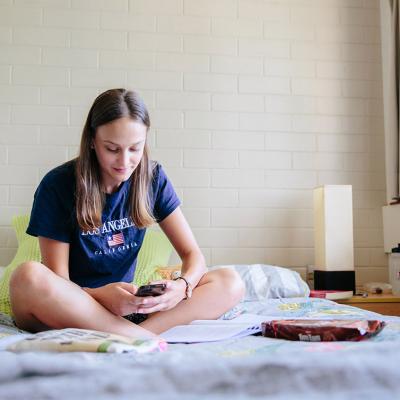High school is tough, but not just for the students – it’s a stressful time for parents, too. Try these parenting strategies for teenagers to help you and your teen survive this scary yet exciting chapter of their life.
You’ve been through high school. You know it’s no walk in the park.
Now, you’re experiencing it all over again, and you’ve probably realised it’s no easier being a parent to a teenager.
To make the journey more bearable (maybe even enjoyable), we’ve put together a list of our top teenage parenting tips to help guide you.
Teenage parenting tips
Firstly, we're going to acknowledge that a one-size-fits-all approach doesn't work for everyone. You may find that some of these parenting strategies for teenagers work a treat, while others miss the mark by yards. So, before we delve into our parenting tips, we want to highlight one of our top pieces of advice for parents of teenagers - it's about finding what works best for you and your child, and that may involve a lot of discussion, and a bit of trial and error. There's no one way to parent.
Let's get started.
Establish clear boundaries with your teenager
Setting boundaries with your teen is an important part of helping them gain independence while also keeping them safe.
As your teen enters the later years of high school, it’s likely they’ll be exposed to new experiences and situations. Boundaries are necessary to provide clarity on what behaviour will and won’t be tolerated in your household. Areas to discuss might include curfews, illegal substances, consent, extracurricular activities, schoolwork expectations, social gatherings and conduct at home.
If you sit down with your teen to establish and agree on boundaries together, there shouldn’t be any ambiguity around what they can and can’t do. When doing this:
- establish a friendly and open tone to the conversation
- listen to and address your teen’s concerns
- be firm and precise when setting boundaries to avoid miscommunication
- be open to negotiate on points they disagree with, but be clear when something is non-negotiable and explain why
- discuss the potential consequences of boundaries getting crossed.
Being a parent to a teenager means the process of boundary-setting will continue to evolve as they grow older. These boundaries should guide your teen to behave responsibly and make smart decisions.

Monitor your teen's social media activity
While your teen is entitled to a level of privacy you should respect as a parent, navigating the role social media plays in their day-to-day lives can be tricky. There are benefits that come with such easy access to the digital world; however, it also creates a myriad of potential issues and dangers.
Excessive social media use can:
- be addictive
- lead to sleep deprivation
- potentially exacerbate symptoms of anxiety and depression.
And that’s without even mentioning inappropriate content and behaviour, such as cyberbullying and sexting.
The way you monitor your 16-year-old’s social media use will greatly differ to how you would a 12-year-old’s. Trust is key to finding that perfect balance between your teen’s need for privacy and your need to know they’re being safe and responsible. You may choose to limit their screen time during the week, stay across the apps they use, have open conversations around the negatives of social media and keep an eye out for inappropriate behaviour online.
Looking for more tips on how to ensure your teen's safety online? The Australian Government's eSafety Commissioner website has some great resources for parents.
Communicate openly with your teenager
Our best advice for parents of teenagers is to be someone they can confide in. By establishing yourself as both a parent and a confidant, they’ll feel more comfortable opening up to you.
Your high schooler’s independence will grow over the years, which may sometimes lead to you getting shut out from their feelings or not understanding what they’re going through. Keeping the lines of communication open between the two of you will help to reduce these growing pains.
This isn’t just about asking them how their day was. If you can navigate the closeness of your relationship and offer them authenticity, respect and an open mind, it’s more likely they will give you the same in return.

Validate your teen's feelings
High schoolers are under more stress than ever before, with pressure to:
- succeed academically
- excel at sports
- work a part-time job
- maintain a social life
- figure out what they want to do for the rest of their life.
Some parents make the mistake of dismissing their teenager’s emotions to teach them perspective or because they don’t believe their feelings are valid.
When a person’s feelings are invalidated, they believe their emotions aren’t being communicated or received, leaving their needs unmet. This can cause them to escalate their reactions and – if this continues to occur – may lead them to experience emotion dysregulation.
Whether your teen is stressed, struggling, upset, angry, happy or triumphant – listen, empathise and validate their feelings so they feel heard and understood.
Treat your teenager like a young adult
Put yourself in your teen's shoes and consider: what do teenagers want from their parents? While they might be free from the full weight of adult responsibility and still require rules and consequences, they’re at a period of life where they crave independence and equal treatment.
Many teenagers are ready for more responsibility, and it’s up to us as parents to provide them with opportunities to exercise it. You can start preparing your teen for adulthood by:
- giving them more tasks to do at home
- teaching them basic life skills (like how to cook and do laundry)
- letting them face consequences of their actions
- helping them think through big decisions.
Remember: high school is tough, and so is being a parent. But if you take on board these good parenting tips for teenagers, you’ll both have a better chance of making it through the adolescent years in one piece.
Want to prepare your teen for what life after school looks like? Share these tips for preparing for success at UQ.





